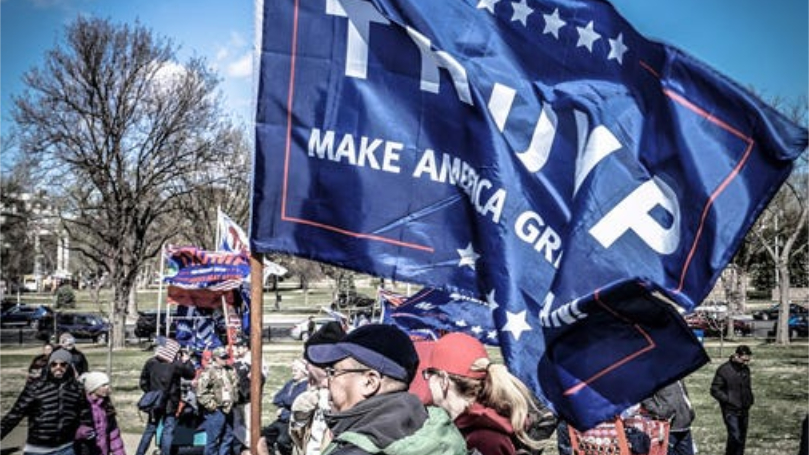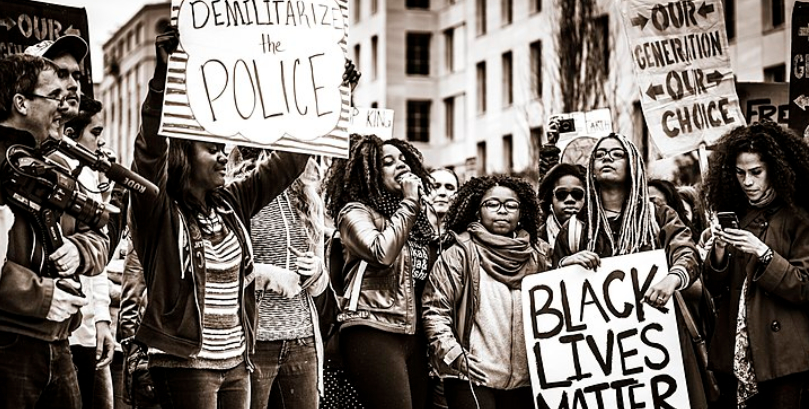
This piece is a contribution to the Pre-Convention Discussion for our 32nd National Convention. During Pre-Convention Discussion, all aspects of the party’s program, strategy, and tactics are up for consideration and debate. The ideas presented here are those of the author or authors alone, and do not necessarily reflect the positions of the Communist Party USA, its membership, or their elected leadership bodies. — Editors
The Communist Party’s main discussion document “Forward together: For pre-convention discussion” states that capitalism’s crisis today is “rooted in capitalism’s drive for maximum profits, class struggle and the system’s inherent racial and gender inequality.”
Because racism and related ideologies — nationalism, xenophobia, antisemitism and religious bigotry — are the main “building blocks of fascism” and decisive for splitting and weakening the working class and its necessary leadership of the democratic struggles, “the battle against racism … is central to overcoming the MAGA right and strengthening democracy overall. Indeed, the fight against racism is central to class unity and therefore social progress.”
The U.S. ruling class has long utilized racism to divide the working class. Their biggest fear is a united working class able to challenge the reign of capital. No worker, including white workers, has a material interest in maintaining such a system.
The super-profits accumulated from racist wage gaps, a product of institutionalized forms of discrimination, amount to hundreds of billions annually, sustaining capitalist accumulation in otherwise crisis conditions. No worker, including white workers, has a material interest in maintaining such a system.
The key role of the anti-racist struggle in building the unity and strength of our class in no way diminishes the critical and decisive struggles against male supremacy, xenophobia, antisemitism, homophobia, or transphobia. Our anti-racist struggle necessarily understands how systems of oppression are intertwined, mutually reinforcing one another. We build strategies to win all workers to the anti-racist and anti-fascist struggles.
History
Although the Civil Rights movement led to a decrease in overt racism, ongoing structures of institutional racism have remained embedded in U.S. society. To dislodge those institutional barriers would not only benefit African Americans, but all nationally oppressed people and the working class as a whole, including white workers.
For example, to alleviate the structural oppression of minority nationalities in the U.S. would require a national policy of full employment and job training, free health care for all, free education from preschool to graduate school, and affordable housing. A large membership in labor unions where wages and conditions of work are matters of contract and shared knowledge would significantly reduce gender, sex, and racially-based wage discrimination. These would be the major aspects of a national policy of reconstruction. Not only would these policies benefit the oppressed nationalities of our country – they would also benefit the entirety of the working class.
Focusing on anti-racist struggle is necessary to strengthen the unity of the working class, strengthen its political power, and create favorable conditions for the anti-monopoly struggle and socialist transition.

Not only would these policies benefit the working class and oppressed nationalities, but they would also adversely affect the ruling class. In short, the successful fight for these structural reforms – and the democratic struggles needed to bring them into effect – would radically alter the political structure of the U.S. It would force a substantial political realignment of bourgeois politics.
The ruling class is aware of this and uses the divisive role of racism to keep these democratic forces from forming a political unity. The present ruling class is well aware of the danger to them of the unity of the multinational working class and the oppressed nationalities.
The response of the ruling class to that potential unity is to poison the relations between the white section of the working class and the oppressed nationalities.
Trump has been a master at exploiting racism as a means to divide the working class and its allies. In the past few years, they have demonized programs that promote Diversity, Equity and Inclusion (DEI), the teaching of Critical Race Theory (CRT), and the teaching of African American, Chicano, Asian American, and native American history.
They have demonized the immigration of people from Africa and Latin America as people from “shithole” countries who will “poison the blood” of the United States; a reference to Hitler’s policies. Given the racist history of the U.S., it’s not surprising that many workers are influenced by this rhetoric.
In this year’s Super Bowl, the crowd listened to the Lift Every Voice and Sing, sung by Andra Day, and the National Anthem , sung by Reba McIntire. More than 123.4 million people watched. Lift Every Voice, termed the African American National Anthem, was booed by a considerable number of those in the viewing stands. One right-wing media commentator, Megan Kelly, remarked, “The so-called ‘Black National Anthem’ does not belong at the Super Bowl. We already have a National Anthem and it includes everyone.”
Apparently, Kelly, as most Americans, is unaware of the third stanza of the National Anthem, which includes the phrase “No refuge could save the hireling and slave, from the terror of flight or the gloom of the grave.” Which is interpreted as “…we will pursue you (the rebelling slaves) to your grave to get revenge.”
One commentator noted, “The cheering of McIntire and the mixed reception of Day’s performance reflect a broader societal struggle with race, identity, and unity. While the inclusion of Lift Every Voice and Sing as a step forward in acknowledging the contributions and trials of African Americans, others perceive it as divisive, viewing the traditional National Anthem as the sole unifying song appropriate for such occasions.”
While one may consider this example anecdotal, it reflects a genuine divide within the nation and within the working class.

The Communist Party has long held the position that the struggle against racism is central to the prosecution of the class struggle. As long as the working class is divided on the issue of racism, the class will never unite. Recognizing the key importance of this issue, the Communist Party must be in the lead of the fight against racism.
Ironically, the historical basis for the unity of African American and white workers is bound in history. In Capital, Marx references that the “rosey dawn of the era of capitalist production” was “the turning of Africa into a warren for the commercial hunting of black-skins.” The Caribbean historian, Eric Williams, in his book Capitalism and Slavery, demonstrates that the slave trade provided the primitive accumulation for the launching of the world capitalist system.
Historians of the United States have demonstrated that the capital accumulated by U.S. slave traders served to launch the textile industry, which was the first large industry created in the U.S. Thus, the same forces that consigned Africans in the U.S. to slavery, simultaneously consigned European-Americans to wage slavery and industrial exploitation.
This historical convergence was alluded to in James Jackson’s Revolutionary Tracings: ‘The river of the U.S. working class is not white, nor Puerto Rican, nor Chicano, Indian, Asian, or Black; the working class is international. It is composed of all differentiated national and racial elements that exist in our country, and on a global scale.
“What is the problem? There is ice on the river of the working class. It forms on the largest body of water in the river of the working class, that of the white workers. These ice blocks of chauvinism, racism, of white supremacy and prejudice in the riverbed of the working class impede its flow and diminish the torrential revolutionary power inherent in the waters of the whole working class. Therefore, the “ice of racism” must be melted to unleash the energy of the river of the working class…
“There is more in the riverbed of the working class than the ice floes of prejudice, of racism, of racial backwardness. The ice is temporary; the river is enduring.”
Concrete actions
There are a number of concrete actions that can be initiated locally to expand the Party’s presence in the African American community. As a beginning, where possible:
Establish, with the assistance of the national African American Equality Commission, local African American Equality Commissions at the district level, where there are African American communities.
Study and implement Henry Winston’s program of Triple Concentration.
Expand People’s World coverage of local struggles in the African American community, including through more local contributions.
Hold public forums during Black History Month to discuss the Party’s history in the struggle against racism and national oppression.
Images: Trump flag by Kelly Kanayama (Medium) (Creative commons); The Black Lives Matters movement started gaining attention in 2013 for its resistance and activism protesting police brutality and racial discrimination against Black people by Johnny Silvercloud (Wikimedia Commons); A family portrait with, from left, Ruth with violin, Lettie, Oliver, Robert and Gladys Lishey at home in Watts, 1910 Photograph (public domain)
- Tags:
- Racism


 Join Now
Join Now